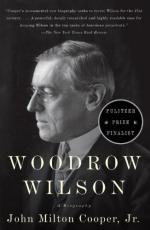|
This section contains 6,314 words (approx. 22 pages at 300 words per page) |

|
SOURCE: "Woodrow Wilson," in The Marcus W. Jernegan Essays in American Historiography, Edited by William T. Hutchinson, The University of Chicago Press, 1937, pp. 102-21.
In the following essay, Sears examines Wilson's various historical writings and attempts to find the systematic articulation of his main political ideals.
Woodrow Wilson did not found a school of historical interpretation. In the field of history his writings were not voluminous or especially important. By neither of the two usual measures of a historian's significance—originality of interpretation and productive erudition—did Woodrow Wilson establish a valid claim to a first place among American historians. Yet few would doubt the propriety of including him among [the important historians of the United States]. The explanation is not simple. Nothing that touched Wilson is ever truly simple. He defies analysis as a person, as a politician, or as a statesman. Even in his relatively minor...
|
This section contains 6,314 words (approx. 22 pages at 300 words per page) |

|


